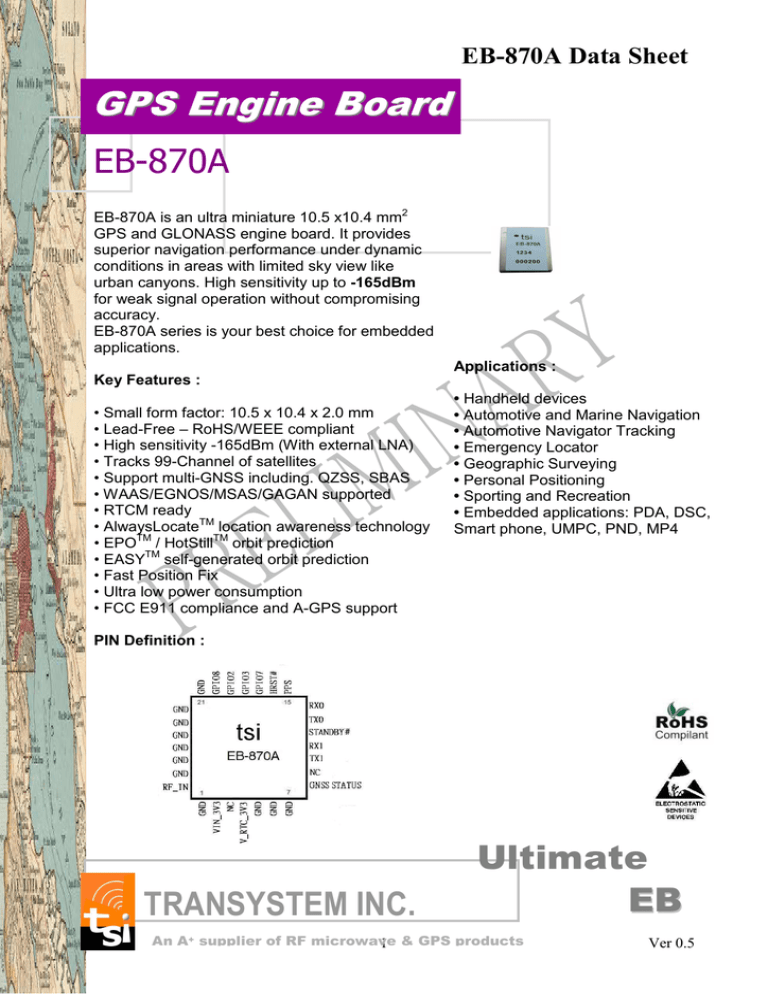
EB-870A Data Sheet
GPS Engine Board
EB-870A
EB-870A is an ultra miniature 10.5 x10.4 mm2
GPS and GLONASS engine board. It provides
superior navigation performance under dynamic
conditions in areas with limited sky view like
urban canyons. High sensitivity up to -165dBm
for weak signal operation without compromising
accuracy.
EB-870A series is your best choice for embedded
applications.
Applications :
Key Features :
• Small form factor: 10.5 x 10.4 x 2.0 mm
• Lead-Free – RoHS/WEEE compliant
• High sensitivity -165dBm (With external LNA)
• Tracks 99-Channel of satellites
• Support multi-GNSS including. QZSS, SBAS
• WAAS/EGNOS/MSAS/GAGAN supported
• RTCM ready
• AlwaysLocateTM location awareness technology
• EPOTM / HotStillTM orbit prediction
• EASYTM self-generated orbit prediction
• Fast Position Fix
• Ultra low power consumption
• FCC E911 compliance and A-GPS support
• Handheld devices
• Automotive and Marine Navigation
• Automotive Navigator Tracking
• Emergency Locator
• Geographic Surveying
• Personal Positioning
• Sporting and Recreation
• Embedded applications: PDA, DSC,
Smart phone, UMPC, PND, MP4
PIN Definition :
TRANSYSTEM INC.
Ultimate
EB
An A+ supplier of RF microwave
1 & GPS products
Ver 0.5
EB-870A Data Sheet
Revision History
Rev.
Date
Description
0.5
11-09-2012
Modify Standby current
0.4
09-25-2012
Update V_RTC Quiescent Current info
0.3
08-28-2012
Revise GPS / GLONASS description
0.2
08-27-2012
Update GNSS status
0.1
08-22-2012
Initial draft
MM-DD-YYYY
2
Ver 0.5
EB-870A Data Sheet
EB-870A is ESD (electrostatic discharge) sensitive device and may be
damaged with ESD or spike voltage. Please handle with care to avoid
permanent malfunction or performance degradation.
Use of GPS / GLONASS Data and Services at the User’s own risk
The GPS / Glonass data and navigation services providers, system makers and
integrated circuit manufacturers (“Providers”) hereby disclaim any and all
guarantees, representations or warranties with respect to the Global Positioning
Systems (GPS) data or the GPS / Glonass services provided herein, either
expressed or implied, including but not limited to, the effectiveness, completeness,
accuracy, fitness for a particular purpose or the reliability of the GPS / Glonass data
or services.
The GPS / Glonass data or services are not to be used for safety of life applications
or for any other application in which the accuracy or reliability of the GPS / Glonass
data or services could create a situation where personal injury or death may occur.
Any use therewith are at the user’s own risk. The Providers specifically disclaims
any and all liability, including without limitation, indirect, consequential and incidental
damages, that may arise in any way from the use of or reliance on the GPS /
Glonass data or services, as well as claims or damages based on the contravention
of patents, copyrights, mask work and/or other intellectual property rights.
No part of this document may be copied, distributed, utilized, and transmitted in any
form or by any means without expressed authorization of all Providers. The GPS /
Glonass data and services are in part or in all subject to paten, copyright, trade
secret and other intellectual property rights and protection worldwide.
Transystem Inc. reserves the right to make change to specifications and product
description without prior notification.
© 2012 TRANSYSTEM INC. all rights reserved.
3
Ver 0.5
EB-870A Data Sheet
Table of Contents
1
1.1
1.2
1.3
1.4
2
2.1
2.2
2.3
3
3.1
3.2
3.3
4
4.1
5
5.1
5.2
5.3
5.4
6
7
7.1
7.2
7.3
7.4
7.5
7.6
8
8.1
8.2
Introduction............................................................................................................5
Key Features......................................................................................................5
Applications........................................................................................................5
Look & Feel........................................................................................................5
Labeling .............................................................................................................5
Technical Description ............................................................................................6
Block Diagram....................................................................................................6
Pin Definition......................................................................................................7
Specifications .....................................................................................................8
Electrical Characteristics .......................................................................................9
Absolute maximum ratings.................................................................................9
Operating Conditions .........................................................................................9
DC Electrical Characteristics..............................................................................9
Serial Port Interface.............................................................................................10
Protocol............................................................................................................10
4.1.1
NMEA Protocol......................................................................................10
Dimension and Package......................................................................................11
Mechanical Dimension..................................................................................... 11
Recommend Layout Pattern ............................................................................ 11
PIN Coordinates...............................................................................................12
Package ...........................................................................................................12
Recommended IR Profile ....................................................................................13
Application Information ........................................................................................14
GPS / GLONASS Antenna Recommendations ................................................14
Application Circuit ............................................................................................14
PPS pin ............................................................................................................15
Reset Signal.....................................................................................................15
Battery Back-up ...............................................................................................15
General GPS / GLONASS Receiver User’s Tips..............................................16
Quality and Reliability ..........................................................................................17
Environmental Conditions ................................................................................17
How to avoid ESD damage to module .............................................................17
4
Ver 0.5
EB-870A Data Sheet
1 Introduction
EB-870A is an ultra miniature 10.4 x10.5mm2 GPS and GLONASS engine board with
added features. It provides superior navigation performance under dynamic
conditions in areas with limited sky view like urban canyons. High sensitivity up to 165dBm for weak signal operation without compromising accuracy. EB-870A is your
best choice for embedded applications.
1.1 Key Features
•
•
•
•
•
Small form factor: 10.4 x 10.5 x 2.0 mm
Lead-Free – RoHS/WEEE compliant
High sensitivity -165dBm (with external LNA)
Tracks 99-Channel of satellites
Fast Position Fix
• Ultra low power consumption
• AlwaysLocateTM location awareness technology
• EPOTM / HotStillTM orbit predition
• EASYTM self-generated orbit prediction
1.2 Applications
•
•
•
•
•
•
•
Handheld devices
Automotive and Marine Navigation
Automotive Navigator Tracking
Emergency Locator
Geographic Surveying
Personal Positioning
Sporting and Recreation
• Embedded applications such as: PDA, DSC, Smart phone, UMPC, PND, MP4
1.3 Look & Feel
1.4 Labeling
There are 4 lines of top marking on the GPS engine and they are :
A
Line #1: TSI company icon
Line #2: Model number, i.e. EB-870A
Line #3: Date code, the year and week when the product is built
Line #4: Lot control code for TSI internal use
5
Ver 0.5
EB-870A Data Sheet
2 Technical Description
2.1
Block Diagram
6
Ver 0.5
EB-870A Data Sheet
2.2
Pin#
1
2
3
4
5
6
7
8
9
10
11
12
13
14
15
16
17
18
19
20
21
22
23
24
25
26
27
28
Note :
Pin Definition
Signal Name
GND
VIN_3V3
NC
VRTC_3V3
GND
GND
GND
Type
Description
P
P
NC
P
P
P
P
Ground
Power Supply 2.8~4.2V DC
NC
RTC power 2.0~4.2V, 40uA @ 3.3V typical
Ground
Ground
Ground
GNSS status, blink when GPS or GLONASS has
GNSS Status
O
position fix
NC
NC
NC
TX1
O
UART port 1 output, leave open if not used
UART port 1 input (RTCM only),
RX1
I
leave open if not used
Falling edge trigger. Back to High for normal
STANDBY#
I
operation. Leave open if not used
TX0
O
UART port 0 for NMEA output
RX0
I
UART port 0 input
PPS
O
PPS
Reset input, active low. Internal pull high,
HRST#
I
leave open if not used
General input / output ; SPI serial output,
GPIO3 / SO
I/O*
leave open if not used
General input / output ; SPI clock output,
GPIO4 / SCK
I/O*
leave open if not used
General input / output ; SPI select, active low,
GPIO5 / SCS#
I/O*
leave open if not used
General input / output ; SPI serial input,
GPIO2 / SI
I/O*
leave open if not used
GND
P
Ground
GND
P
Ground
GND
P
Ground
GND
P
Ground
GND
P
Ground
GND
P
Ground
GND
P
Ground
Antenna port, L1 band 1573MHz ~1610MHz
RF_IN
I
DC O/P: 2.8V Current ≦ 25mA
1) P: Power, I: Input, O: Output, I/O: Input or Output
2) GPIO current output default:4mA, Max :16mA
7
Ver 0.5
EB-870A Data Sheet
2.3 Specifications
Item
General
Sensitivity
Update Rate
Accuracy
Acquisition
(open sky)
Reacquisition
Dynamics
Supply Voltage
Power
Consumption
Backup Battery
NMEA Message
Datum
Antenna
Serial Interface
Description
L1 frequency, C/A code (SPS)
99 independent tracking channels
-165dBm /Tracking; -148dBm /Acquisition
Up to 10Hz
Without aid: 3.0m 2D-RMS
<3m CEP (50%) without SA (horizontal)
DGPS (WAAS, EGNOS, MSAS, RTCM): 2.5m
Cold Start: <35sec
Warm Start: <34sec
Hot Start: <1.5sec
< 1sec
Altitude:18000m(max.)
Velocity:515m/sec(max.)
Vibration:4G(max.)
DC 2.8~4.2 V
< 20 mA @ 3.3V (w/o Active ANT) / Tracking
DC 2.0~4.2V, 40 uA@3.3V typical
NMEA0183 v4.1
GGA, GSA, GSV, RMC ( Default ) / GLL, VTG (Optional )
Baud rate 4800/9600/…/115200, default 9600
Default WGS-84
External Active Antenna Output Voltage: 2.8 VDC
or Passive Antenna
UART
Operating Temp.
-40℃ to 85℃
Storage Temp.
Operating
Humidity
Mounting
-40℃ to 85℃
Dimension
≦95%, non condensing
SMT Type, 28 Pin
10.5 x 10.4 x 2.0(H) mm
8
Ver 0.5
EB-870A Data Sheet
3 Electrical Characteristics
3.1
Absolute maximum ratings
Symbol
Vcc
Vin
Iov
Tst
Iant
Parameter
power supply
voltage to any pin
input current on any pin
storage temperature
antenna supply current
Min
Max
Unit
-0.3
-0.3
-10
-40
+4.3
+3.6
10
85
30
V
V
mA
°C
mA
Table 3-1 Absolute maximum ratings
Note:
(1) Stresses beyond absolute maximum ratings may cause permanent damage to the device.
(2) Exposure to absolute maximum rating conditions for extended period may affect device
reliability.
3.2
Operating Conditions
Pin
4
Description
V_RTC_3V3
Typical
Max
Unit
2
4
4.3
V
Tracking Current (2)
40
VIN_3V3
2
Min
2.8
3.3
Peak Acquisition Current (1)
uA
4.3
V
25
mA
Tracking Current (2)
18
mA
Standby Current
0.3
mA
Table 3-2 Operating Conditions
Note:
(1) Peak acquisition current is the maximum current with passive antenna.
(2) Tracking current is the average current with passive antenna includes tracking and post
acquisition portion.
3.3
DC Electrical Characteristics
Symbol
Parameter
Min
1PPS, GNSS Status, TX1, TX0,
GPIO 2,3,4,5
Voh
0.85*VDDIO
RX1, RX0, STANDBY#, HRST#
Vol
Max
Unit
V
0.15*VDDIO
V
Vih
0.75*VDDIO
VDDIO+0.3
V
Vil
-0.3
0.25*VDDIO
V
Table 3-3 DC Electrical characteristics
Note:
(1) The typical of VDDIO is 2.8V
9
Ver 0.5
EB-870A Data Sheet
4 Serial Port Interface
EB-870A provides 2- wire digital UART port for communication of GPS / GLONASS
position data using NMEA protocol or MTK extension protocol. UART port is capable
of 4800 to 115200 baud rate.
4.1
Protocol
EB-870A is default to support standard NMEA-0183 protocol. In addition, a series of
MTK extensions (PMTK messages) have been developed that can be used to
provide extended capabilities common to many applications. Please refer to “GPS
Engine Board UART Port Command” for detailed command information.
4.1.1 NMEA Protocol
EB-870A is capable of supporting following NMEA formats:
NMEA Prefix
Format
Direction
$GPGGA
GPS fix data
Out
$GPGLL
Geographic position Latitude / Longitude
Out
$GNGSA
GNSS DOP and active satellites
Out
$GPGSV
GPS Satellites in view
Out
$GPRMC
Recommended minimum specific GNSS data
Out
$GPVTG
Velocity and track over ground
Out
$GPZDA
Date and time
Out
$GLGSV
GLONASS Satellites in view
Out
10
Ver 0.5
EB-870A Data Sheet
5 Dimension and Package
5.1 Mechanical Dimension
5.2 Recommend Layout Pattern
11
Ver 0.5
EB-870A Data Sheet
5.3 PIN Coordinates
Unit:mm
Pin #
1
2
3
4
5
6
7
8
9
10
11
12
13
14
X
0.00
1.10
2.20
3.30
4.40
5.50
6.60
8.55
8.55
8.55
8.55
8.55
8.55
8.55
Y
0.00
0.00
0.00
0.00
0.00
0.00
0.00
1.90
3.00
4.10
5.20
6.30
7.40
8.50
Pin #
15
16
17
18
19
20
21
22
23
24
25
26
27
28
X
6.60
5.50
4.40
3.30
2.20
1.10
0.00
-1.95
-1.95
-1.95
-1.95
-1.95
-1.95
-1.95
Y
10.40
10.40
10.40
10.40
10.40
10.40
10.40
8.50
7.40
6.30
5.20
4.10
3.00
1.90
5.4 Package
EB-870A GPS modules come in tray package suitable for pick and place machines.
Each tray contains total 168 pieces of EB-870A and maximum 10 trays are stacked
together before sealed in ESD protective vacuum dry pack to provide protection
against moisture and ESD during storage and shipment.
12
Ver 0.5
EB-870A Data Sheet
6
Recommended IR Profile
Follow below IR profile for reflow during SMT assembly for EB-870A.
13
Ver 0.5
EB-870A Data Sheet
7 Application Information
7.1 GPS / GLONASS Antenna Recommendations
Follow below recommendations when choosing GPS / GLONASS dual band antenna
for EB-870A for best system performance. Transystem also offers active antenna
products for optimal performance with EB-870A. For details, please contact your
Transystem sales contact directly.
•
•
•
•
•
•
Use active antenna that works with 2.8V power supply
Receiving frequency 1573MHz ~ 1610MHz
Polarization RHCP (right hand circular polarized)
Output impedance = 50 Ohm
15dB ≦ LNA Gain ≦ 20dB
Noise figure ≦ 1.5dB
• Connector: surface mounted on main PCB, Ipex or MMCX
7.2 Application Circuit
【Note 1】: VRTC_3V3 (pin#4) could connect to 3.3V DC power supply or battery
directly. (EB-870A)
14
Ver 0.5
EB-870A Data Sheet
7.3
PPS pin
EB-870A also provides accurate timing information due to the synchronized atomic
clocks in the GPS / GLONASS satellites. In addition to the current date and time is
transmitted in NMEA sentences (UTC), an accurate timing signal is provided via the
PPS pin (pin #15) of the EB-870A GPS / GLONASS receiver.
Under good signal conditions the 1PPS signal comes between 620ns and 710ns after
the full GPS system second which is accurately (around 10ns) synchronized to UTC.
Therefore the 1 second clock can be derived and maintained within around 90ns
under good signal conditions.
The 1PPS signal accuracy directly relates to the position accuracy. The GPS /
GLONASS signals travel at the speed of light, therefore a position inaccuracy directly
translates into 1PPS inaccuracies.
10 m position deviation ≈ 33 ns 1PPS deviation (typically)
100 m position deviation ≈ 333 ns 1PPS deviation (typically)
The 1PPS signal is provided on an “as it is” basis with no accuracy specification.
7.4
Reset Signal
The HRST# pin (pin #16) can be used to reset the EB-870A module. Resetting the
module will result in a restart of the complete firmware.
The EB-870A is equipped with a voltage monitoring circuit that generates a proper
power-on reset signal at the appropriate threshold and delay. Usually there is no
need to deal with the reset input externally, thus the general advice is to leave this pin
open.
7.5
Battery Back-up
VRTC_3V3 input (pin #4) provides back-up power for the RTC and SRAM of the GPS
/ GLONASS receiver module. Typical quiescent current 2uA allows the use of a
separate battery or a “Supercap”. The VRTC_3V3 pin draws 40uA typical under
normal operation
15
Ver 0.5
EB-870A Data Sheet
7.6 General GPS / GLONASS Receiver User’s Tips
In general, GPS / GLONASS receiver performs best in open space where it can see
clean sky. Weather condition will affect satellite signals reception – rain & snow
contribute to worsen sensitivity.
If the satellite signals can not be locked or experiencing receiving problem (while in
urban area), following steps are suggested:
Use of external active antenna if that option exists.
Move to another open space or reposition GPS / GLONASS receiver toward
the direction with least blockage.
Move the GPS / GLONASS receiver away from the interference sources.
Wait until the weather condition is improved.
Some vehicles using heavy metallic sun protecting coating on windshields may affect
satellite signals reception.
Driving in and around high buildings may affect signal reception.
Driving in tunnels or in building structure may affect signal reception.
When GPS / GLONASS receiver is moving, it will take longer time to get
position fix. Wait for satellite signals to be locked at a fixed point when first
power-on the GPS / GLONASS receiver to ensure quick position fix.
16
Ver 0.5
EB-870A Data Sheet
8
Quality and Reliability
Each module is electrically tested prior to packing and shipping to ensure state of the
art product quality and best GPS / GLONASS receiver performance and accuracy.
8.1
Environmental Conditions
Operating temperature
Operating humidity
MSL JEDEC (Moisture Sensitivity Level)
Storage temperature
Storage
-40 ~ +85°C
Max. 95%, non-condensing
3
-40 ~ +85°C
12 months in original package.
8.2 How to avoid ESD damage to module
- Any person handling the module should be grounded either with a wrist strap or
ESD-protective footwear used in conjunction with a conductive or static-dissipative
floor or floor mat.
- The work surface where devices are placed for handling, processing, testing, etc.,
must, be made of static-dissipative material and be grounded to ESD ground.
- All insulator materials must either be removed from the work area or must be
neutralized with an ionizer. Static-generating clothing must be covered with an
ESD-protective smock.
- When module are being stored, transferred between operations or workstations, or
shipped, they must be kept in a Faraday shield container with inside surfaces
(surfaces touching the module) that are static-dissipative.
17
Ver 0.5
EB-870A Data Sheet
Contact Information
Transystem Inc.
No. 1-2 Li-Hsin Rd. I,
Science-Based Industrial Park,
Hsinchu 300, Taiwan, R.O.C.
t : +886.3.578.0393
f : +886.3.578.4111
www.transystem.com.tw
sales@transystem.com.tw
18
Ver 0.5


